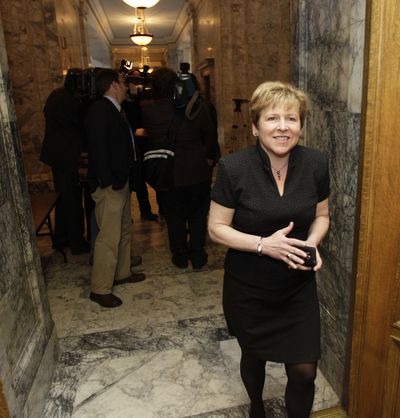State negotiators reach budget deal

OLYMPIA – Legislators slogged through a series of votes Tuesday night that would give the state a balanced budget, pay for nearly $1 billion in government construction projects and implement a series of reforms that could save the state money in the future.
Both chambers were poised to vote on more than a half-dozen bills, an interconnected package of spending cuts and reforms hammered out in negotiations with Gov. Chris Gregoire as the clock ticked toward a midnight deadline.
They made plans to go into a brief special session if necessary to complete votes on the package, which would change the state’s pension system, revise health insurance programs for public school employees and require budgets that balance over four years rather than two.
Those reforms were the price Republicans exacted for a vote on a revision of more than $1 billion in the state’s $31 billion general operating budget and a vote on the new capital construction projects, which Democrats referred to as the Jobs Bill.
That capital construction budget includes some $37 million to complete the Health Sciences and Biomedical Research Center at the Washington State University-Spokane campus.
“This is a really good package for Spokane,” Senate Majority Leader Lisa Brown, D-Spokane, said as the pace of voting slowed slightly before the newspaper’s deadline. “That is the silver lining of a cloudy special session.”
Sen. Mike Padden, R-Spokane Valley, wasn’t quite as enthusiastic. “There are a lot of good parts to the package, especially the reforms,” he said. But he was waiting for more details on the operating budget before offering his full support.
Interlocking agreements to pass the package of bills occasionally bogged down as the two chambers seemed to eye each other with a certain amount of suspicion spawned by months of budget debates. Early in the evening, voting on the capital budget in the Senate was delayed by questions about a vote for pension changes in the House.
But leaders of both houses huddled, emerged with smiles, and voting continued. The Senate passed reforms to the state’s education system that eliminated a requirement to reduce class sizes in public schools, mandated by a voter’s initiative in 2000 but rarely funded. Instead it redirected some $102 million into a special Education Legacy Trust Account and created a task force to find ways to meet court requirements to improve the state’s education system.
Throughout the day, as they moved toward a negotiated settlement, legislators struggled to find different ways to describe “almost a deal” without sounding too positive.
Sen. Joe Zarelli, R-Ridgefield: “We’re on the same sheet of music, except some of the notes need to be clarified. … It’s the little things, the little differences.”
House Minority Leader Richard DeBolt, R-Chehalis: “It’s a framework with some agreements in it … but there are so many moving pieces.”
One legislator described it as trying to juggle eight balls. Asked if that was a good description, DeBolt replied: “It’d be nice if it was only eight.”
Those moving pieces include:
• A revision to the remaining 15 months in the state’s current operating budget, which has a gap of about $1 billion between what the state is expected to collect in taxes and what it is scheduled to spend in programs and wages.
• The state’s capital budget, a smaller spending plan for large construction projects, and ancillary questions over the state debt limit.
• Changes to the state retirement system to close off some early retirement options for new hires.
• A way to bring the health insurance programs for state school employees in line with the benefits for state workers.
• A way to project budgets over four years, instead of the current two years, in a way that prevents spending imbalances like the current one without requiring special sessions for small fluctuations in revenue forecasts.